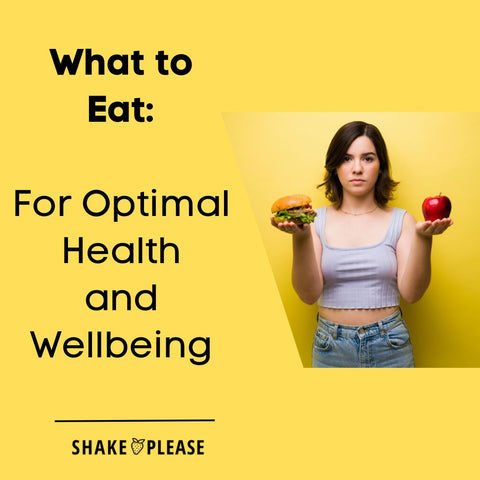
Foods to Include in Your Diet
Learning what to eat in a balanced and nutritious diet is key to maintaining optimal health and well-being. It is important to include a variety of foods from different food groups to ensure you are getting all the necessary nutrients.
Here are some foods that you should include in your diet:
-
Fruits and Vegetables: Fruits and vegetables are packed with vitamins, minerals, and antioxidants that help protect against diseases. Aim to consume a colorful variety of fruits and vegetables to ensure you are getting a wide range of nutrients.
-
Whole Grains: Whole grains such as brown rice, quinoa, and whole wheat bread are rich in fiber, vitamins, and minerals. They provide sustained energy and help regulate digestion.
-
Lean Proteins: Include lean proteins such as chicken, fish, tofu, and legumes in your diet. Proteins including protein powders are essential for building and repairing tissues and support the immune system.
-
Healthy Fats: Incorporate sources of healthy fats like avocados, nuts, and olive oil into your diet. These fats are important for brain function, hormone production, and maintaining healthy skin.
-
Dairy or Dairy Alternatives: Dairy products or dairy alternatives like almond milk and soy yogurt are rich in calcium and vitamin D, which are essential for strong bones and teeth.
What Not to Eat for Optimal Health
While it is important to focus on what to eat, it is equally crucial to be aware of what to avoid. Here are some foods that you should limit or avoid for optimal health and well-being:
-
Processed Foods: Processed foods are typically high in unhealthy fats, added sugars, and sodium. These include items like sugary cereals, packaged snacks, and fast food. Consuming too much processed food can increase the risk of obesity, heart disease, and other health issues.
-
Sugary Beverages: Sugary beverages like soda, fruit juices, and energy drinks are loaded with added sugars and offer little to no nutritional value. These drinks can lead to weight gain, tooth decay, and an increased risk of chronic diseases.
-
Trans Fats: Trans fats are artificially created fats found in many fried and packaged foods. They raise bad cholesterol levels and increase the risk of heart disease. Avoid foods that contain partially hydrogenated oils, as these are a major source of trans fats.
-
Excessive Alcohol: While moderate alcohol consumption may have some health benefits, excessive drinking can lead to a range of health problems. Limit your alcohol intake to promote optimal health.
What Superfoods to Eat
Superfoods are nutrient-dense foods that provide a wide range of health benefits. Including these foods in your diet can boost your overall health and well-being. Here are some superfoods you should consider adding to your meals:
-
Berries: Berries like blueberries, strawberries, and raspberries are packed with antioxidants, vitamins, and fiber. They can help improve cognitive function, support heart health, and boost the immune system.
-
Leafy Greens: Leafy greens such as spinach, kale, and Swiss chard are rich in vitamins, minerals, and phytochemicals. They promote healthy digestion, support bone health, and reduce the risk of chronic diseases.
-
Nuts and Seeds: Nuts and seeds like almonds, walnuts, chia seeds, and flaxseeds are excellent sources of healthy fats, protein, and fiber. They can help lower cholesterol levels, support brain health, and promote satiety.
-
Fatty Fish: Fatty fish like salmon, mackerel, and sardines are rich in omega-3 fatty acids, which are beneficial for heart health and brain function. Aim to consume fatty fish at least twice a week.
-
Turmeric: Turmeric is a spice known for its anti-inflammatory and antioxidant properties. It can help reduce inflammation, support brain health, and boost the immune system.
Healthy Food Smoothies
Smoothies are a convenient way to pack in a variety of nutrients in one delicious drink. Here are some ideas for healthy food smoothies:
-
Green Smoothie: Blend together spinach, banana, almond milk, and a tablespoon of chia seeds for a nutritious and refreshing green smoothie.
-
Berry Blast Smoothie: Combine mixed berries, Greek yogurt, almond milk, and a tablespoon of flaxseeds for a fruity and fiber-rich smoothie.
-
Chocolate Avocado Smoothie: Blend together ripe avocado, unsweetened cocoa powder, almond milk, and a dash of honey for a creamy and indulgent smoothie packed with healthy fats.
Healthy Meal Planning Tips
Meal planning can help ensure you make healthier choices and save time in the kitchen. Here are some tips for healthy meal planning:
-
Plan Ahead: Take some time each week to plan your meals and create a grocery list. This will help you stay organized and avoid impulsive food choices.
-
Batch Cooking: Prepare larger quantities of meals and store them in individual portions. This way, you will have ready-to-eat meals when you're short on time.
-
Include a Variety of Foods: Aim to include a mix of proteins, whole grains, fruits, vegetables, and healthy fats in your meals for a well-balanced diet.
-
Prep Ingredients in Advance: Wash, chop, and portion out ingredients ahead of time to make meal preparation quicker and easier.
Building a Foundation of Healthy Eating Habits
Establishing healthy eating habits is essential for long-term health and well-being. Here are some tips to help you build a foundation of healthy eating habits:
-
Listen to Your Body: Pay attention to your body's hunger and fullness cues. Eat when you're hungry and stop when you're satisfied.
-
Practice Mindful Eating: Slow down and savor each bite. Be present and fully engage your senses while eating.
-
Eat Regularly: Aim to eat regular meals and snacks throughout the day to maintain stable energy levels and prevent overeating.
-
Limit Portion Sizes: Be mindful of portion sizes to avoid consuming more calories than your body needs.
EXPOSING THE LEADING SMOOTHIE AS THE KING OF MEAL REPLACEMENTS
Understanding Macronutrients and Micronutrients
Macronutrients and micronutrients are essential for our bodies to function optimally. Here's a brief overview of their role in our diet:
-
Macronutrients: Macronutrients include carbohydrates, proteins, and fats. Carbohydrates provide energy, proteins build and repair tissues, and fats support brain function and hormone production.
-
Micronutrients: Micronutrients include vitamins and minerals. They are required in smaller amounts but are essential for various bodily functions, such as immunity, bone health, and energy production.
The Role of Hydration in Overall Well-being
Staying hydrated is crucial for overall well-being. Water plays a vital role in regulating body temperature, aiding digestion, and keeping our organs functioning properly.
Aim to drink at least 8 cups of water per day and hydrate more during physical activity or hot weather.
SMOOTHIE DELIVERY TO GET YOU IN THE ZONE
Conclusion: Making Conscious Food Choices for a Healthier and Happier You
Optimal health and well-being can be achieved through conscious food choices. By including a variety of nutrient-dense foods in your diet, avoiding processed and unhealthy foods, incorporating superfoods, and following healthy meal planning tips, you can nourish your body and promote overall well-being.
Remember to listen to your body, practice mindful eating, and stay hydrated. Making these changes can lead to a healthier and happier you.
Start being conscious of what to eat along with making the right food choices today.





